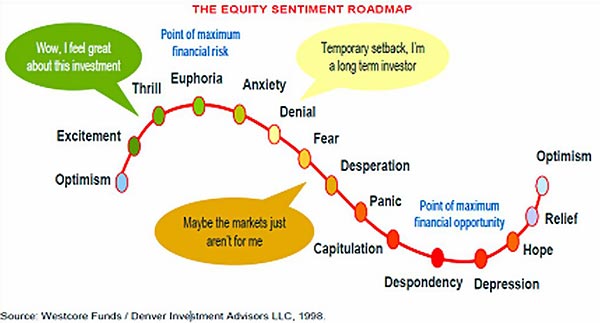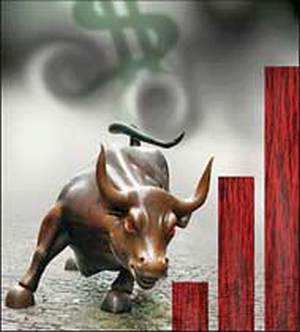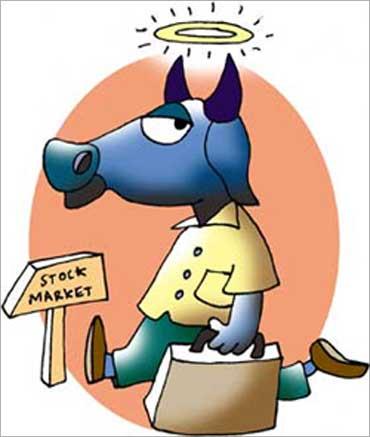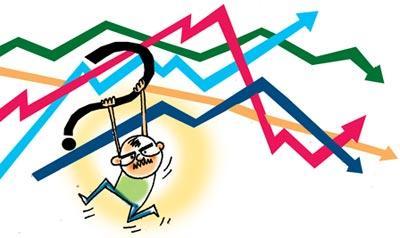 | « Back to article | Print this article |
10 golden rules for investing in stock markets
What investors need to understand and follow to avoid common investing blunders in an overheated market.
1. Don't let emotions overrule economics
Investors usually go through an entire cycle of emotions that replicate the ups and downs in the stock market.
The Equity Sentiment Roadmap (below) showcases typical investor behavior.
Often, investor sentiments graduate from optimism to euphoria as the markets inch higher towards all-time highs, as witnessed in the previous bull runs of 1990s, the dot-com era of 2000 and the recent 2008 phase.
The extreme emotions are reflected even during the market crash wherein there is a panic sell-off by investors to limit their losses.
In each of these periods emotions control the investor behaviour rather than the economics.
For example, at the helm of dot-com phase, some investors invested in IT companies whose valuations were at extremely high levels and so were investor confidence!
No doubt these companies were good but they were mis-priced.
Eventually when the markets corrected, investors had to exit at a loss. An immediate outcome of such an unpleasant experience is that investors prefer to stay away from the markets.
Again this is an extreme alternative.
To create wealth and avoid pitfalls of emotional decision-making, a simple mantra can be:
- Thoroughly crosscheck fundamentals and sentiments before stock selection
- Gauge how the possible loss on the investment will affect you, and
- Have realistic return expectations
Read more to understand and avoid common investing blunders in an overheated market...

Disclaimer: This article is for information purpose only. This article and information do not constitute a distribution, an endorsement, an investment advice, an offer to buy or sell or the solicitation of an offer to buy or sell any securities/schemes or any other financial products /investment products mentioned in this article or an attempt to influence the opinion or behavior of the investors /recipients.
Any use of the information /any investment and investment related decisions of the investors/recipients are at their sole discretion and risk. Any advice herein is made on a general basis and does not take into account the specific investment objectives of the specific person or group of persons. Opinions expressed herein are subject to change without notice.

2. Check for lemons
Companies do well on the exchanges mainly due to their historical and forward earnings expectations, growth prospects, virtue of the business, robust top management and governance practices.
So, retail investors should look at companies who have consistently delivered in terms of earnings growth, capital expansion, dividend yield, and have a strong leadership.
While this task may be excruciating, companies who are fundamentally solid would continue to give handsome gains whether or not the market is overheated.
On the contrary, certain stocks may be rallying on account of liquidity (excess cash floating around in the financial markets) and momentum in the market but such an upside may not be sustainable.
Hence, it is important for investors to track and maintain a supplementary portfolio for high-risk securities in an overheated market.3. Say NO to amateur-turned-expert
In an overheated market, everyone has their own basket of 'hot tips' and market advice and most often, even the not-so-great stocks are rated highly.
Before relying on these so called 'hot tips' one should keep in mind that they may come with inherent risks that may not be suitable to your portfolio.
A thorough understanding of the security, the risk adjusted returns and future potential ought to be known to you as an investor.
Else, a better way to invest is to take services of a qualified adviser with good credentials or invest in mutual funds managed by professional fund managers.4. Ask for 'value for money'
A typical trait of overheated market is that valuations become overly expensive and euphoria drives the market upwards. We always look for 'value for money' deals for simple things like a cheese burger, but quite often overlook valuations while buying financial assets.
On a retail level, it may be difficult to keep track of the price to earnings (P/E) ratio or price to book value (P/BV) of companies.
Also, the past laggards may not necessarily become top performers of tomorrow.
Nonetheless, while buying financial assets, investors need to be mindful of the current valuations and future potential of a sector, theme and stock.
Mutual funds offer value funds category which follows value style of investing wherein these funds pick up companies, which are currently undervalued, compared to the rest of the market. But in an overheated market, it is likely that very few solid companies remain below their actual value.
Despite this, value funds, which strictly adhere to the value philosophy, are suitable for investors with a time horizon of more than 3-5 years.
5. Rebalance your portfolio
Sophisticated investors who have the expertise and time should monitor their holdings and re-balance the stock portfolio, particularly in an overheated market.
Notably, informed investors should set a ceiling on expected return and shift profits into fixed income asset or another optimal investment once the return target has been met. Rebalancing portfolios in a disciplined manner maximises returns akin to the stop-loss mechanism used to restrict losses.
Investors can also consider fund of funds, which reallocate money from a diversified equity fund to a bond fund, each time the market breaches a P/E level.
For example, Franklin Templeton India Dynamic PE Ratio Fund of Funds changes allocation to funds as per the P/E ratio of benchmark index.
As the valuations of the S&P CNX Nifty Index go up, the fund's assets are moved into Templeton India Income Fund and Franklin India Bluechip Fund holds the rest.
This is reversed when the PE ratio falls or the market becomes cheaper.6. Know that the market is a collection of participants
Large and institutional players can easily dominate the market owing to their sheer size and better access to information.
Huge momentum plays by the market participants can occur, at times escalating the stock prices; similarly, these stock prices get beaten down to their intrinsic value over time with lack of interest.
Foreign institutional investors (FIIs) usually have allocation to countries and regions across the globe. Therefore, the nature of flows in India and other markets is inter-connected.
Based on the relative valuation, appetite for risk, and macro-economic circumstances across the world the flows into or out of India are determined. These inflows and outflows, again, affect market levels as well as prices of individual stocks irrespective of any major fundamental changes.
Currently, the retail and domestic investments are a small force to reckon with in the equity markets, so factors such as liquidity, global uncertainty and systematic risk would continue to play in India, affecting the value of your holdings.7. Be fearful when others are greedy and greedy when others are fearful
Warren Buffet, investment guru, has given an excellent dictum, particularly true, for extreme market scenarios when the valuations are either stretched or at rock bottoms.
Though, investors are most likely to follow general market consensus, this quote may help you assess your holdings through the irrational exuberance which is most dominant in an overheated market.
8. Avoid impatience
What if you have already invested in an overheated market?
Well, this is a tricky situation. Investors end up holding a loss-making investment for too long. Yet, there are some who average out the investment trying to reduce the purchase price but it will work well only if the stock recovers from the low levels.
On the other hand, if the price falls further, you may end up with even higher negative returns. Eventually, the stock may go back to the same level in the long term but that may not serve your investment purpose.
Instead of chasing flashy returns overnight, investors should follow all the above principles and stick to good quality companies at fair valuations or simply, invest in equity funds.9. Accept that equity market has aberrations but delivers returns in the long term
The stock markets experience volatility and witness periodical cycles depending on favourable market environment, economic policies and liquidity.
Most experts would agree that equity outperforms all other asset classes in the long run. Especially in a high growth economy like India having perpetually high levels of inflation, investors stand to gain more by allocating some of their savings to the equity asset class.
Hence, it is important to invest regularly in piecemeal irrespective of the market levels.
10. Worry about your financial plan and not the market movements
Most of asset bubbles in the history have left not just retail investors but biggest experts, fund managers and bankers perplexed. Who would have imagined Lehman Brothers' collapse or AIG filing for bankruptcy?
Therefore, investors should first evaluate their savings and major expenses, identify the investment objectives and then, allocate money systematically every month towards achieving their financial goals.
Align the maturity of investment products to your major expenses plus book timely profits according to your monetary needs and don't miss out on buying opportunities whenever the markets are relatively cheap.
A disciplined approach to investing and wise asset allocation will reap benefits for you in the long term and you will never have to worry about Mr. Markets!






